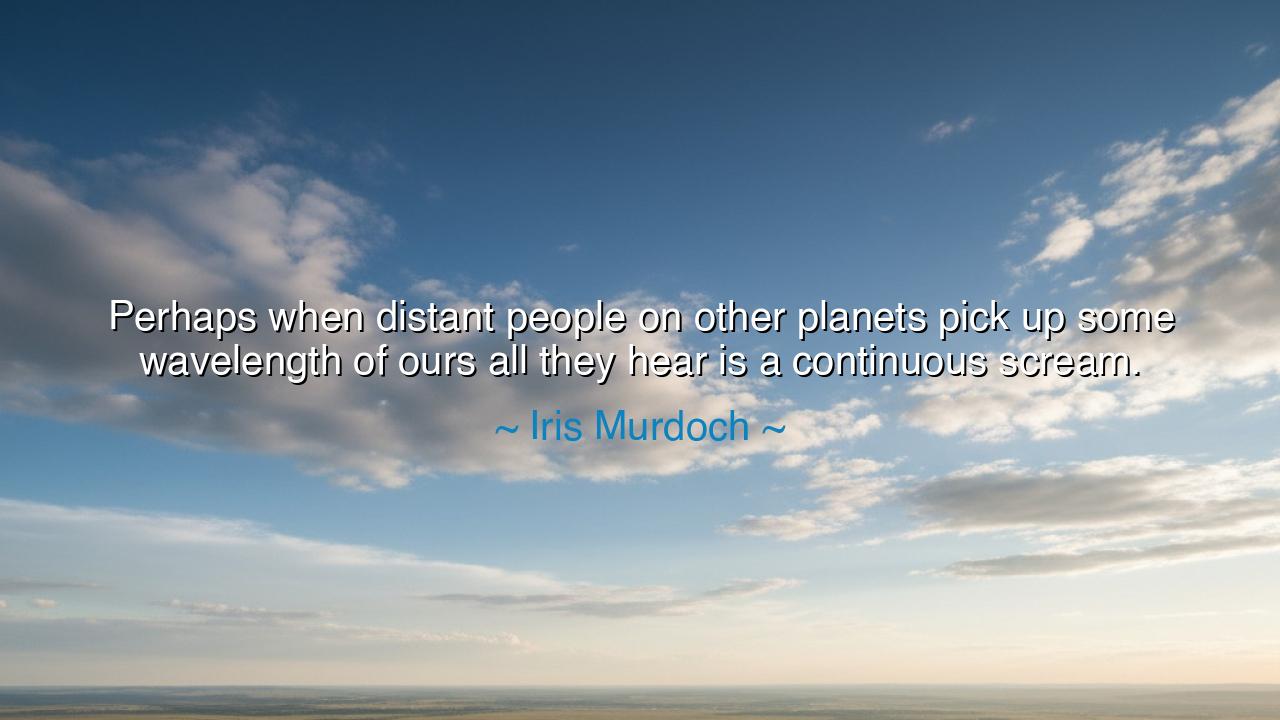
Perhaps when distant people on other planets pick up some
Perhaps when distant people on other planets pick up some wavelength of ours all they hear is a continuous scream.






In the vast expanse of the cosmos, where the stars are scattered like the sparks of a great celestial fire, there are deep questions that stir the heart. Iris Murdoch, a philosopher and writer whose keen insights into the human condition illuminate the struggles and joys of life, once said: "Perhaps when distant people on other planets pick up some wavelength of ours all they hear is a continuous scream." This profound observation invites us to reflect on the state of humanity, not just as we understand ourselves, but as others—whether on this Earth or in the far reaches of the cosmos—might perceive us. It challenges us to look deeply at our own actions, our own voices, and to ask: what message are we sending into the universe?
Consider, O seekers of wisdom, the ancient sages and their reflections on the voice of humanity. The great philosophers of old, from Socrates to Plato, often pondered the nature of human existence and the moral direction of society. They understood that every society, every individual, sends a signal to the world, whether consciously or unconsciously. Yet what if, like Murdoch suggests, that signal is not one of harmony and wisdom, but a scream—a cry born from fear, anxiety, or confusion? The ancient world, though it sought truth and understanding, was often filled with strife and discord. The Greeks, though they gave birth to the very concept of philosophy, were also deeply divided in their wars and conflicts. And so, too, today, we must ask whether our modern voices—echoing through the airwaves and across the cosmos—sound more like a scream than a song.
As Murdoch’s words suggest, when we send our signals into the vastness of space, what might those who listen hear? The ancient Babylonians gazed at the stars and saw them as divine, mysterious symbols of a higher order. Yet, they also believed that the gods could hear their cries in the night, their prayers and lamentations reverberating through the heavens. In the same way, we too send signals into the night, our voices rising not always in unity, but often in discord. The constant noise of our modern world—our endless communication, our struggles, our passions, and our fears—may indeed sound like a scream to those who do not understand our context, just as the cries of the ancient world may have seemed to be nothing more than a cacophony to the gods above.
One need not look far for examples of this scream in history. Think of the world wars that ravaged the Earth, or the cries of those who suffered under the weight of oppression. From the great battles of the ancient world to the more modern atrocities that plague our history, humanity has often been heard screaming, not with the clarity of reason and compassion, but with the sharpness of pain and confusion. The wars, the conflicts, the divisions—they are all part of the human story, and yet they are not the only story. Even in times of great darkness, there are still those voices who rise above the noise to sing of hope, of unity, of the possibility of a better future.
Take, for example, the life of Mahatma Gandhi, whose voice was not one of screaming or violence, but of peaceful resistance, of hope in the face of despair. Gandhi spoke to the world not with a cry of anger, but with a call to action that resonated with millions. His message was not about destruction, but about building something better through nonviolence and understanding. When we speak into the cosmos, it is not just our screams that are heard, but our ideals, our aspirations, and our hopes. The challenge, then, is to make sure that the message we send is one of clarity and peace, not of desperation or discord.
Now, O children of the Earth, what is the lesson that Murdoch’s words teach us? We are, each of us, connected to the greater whole of humanity. And the wavelengths we send into the world—through our actions, our words, and even our silence—carry far beyond what we can perceive. What kind of message do we wish to send to those who might listen, whether they are on another planet or in another place in time? Is our message one of peace, of hope, and of growth? Or is it a reflection of the inner turmoil, the chaos, and the fear that too often dominate our hearts and minds?
In your own life, take this lesson to heart: speak and act with intention and clarity. Do not let your voice be one of fear, but one of hope. Do not let the noise of the world drown out your message, but strive to send signals of peace and wisdom into the great expanse, whether it is through the way you treat others, the actions you take in your community, or the way you communicate with the world. Like Gandhi, or the philosophers of old, make your voice one that resonates with purpose, that contributes to the chorus of humanity’s collective journey.
And so, let Murdoch’s words guide you. As you send your own signal into the world, make sure it is not lost in the screams of fear, hatred, or division. Seek to rise above the noise, to contribute to the greater harmony of the human race. For in the end, it is not the screams that will be remembered, but the songs of wisdom, unity, and peace that will echo throughout the universe. Let your message be one that, when heard by others, whether on distant planets or in future generations, will be a testament to the beauty of humanity’s potential for growth and understanding.






AAdministratorAdministrator
Welcome, honored guests. Please leave a comment, we will respond soon